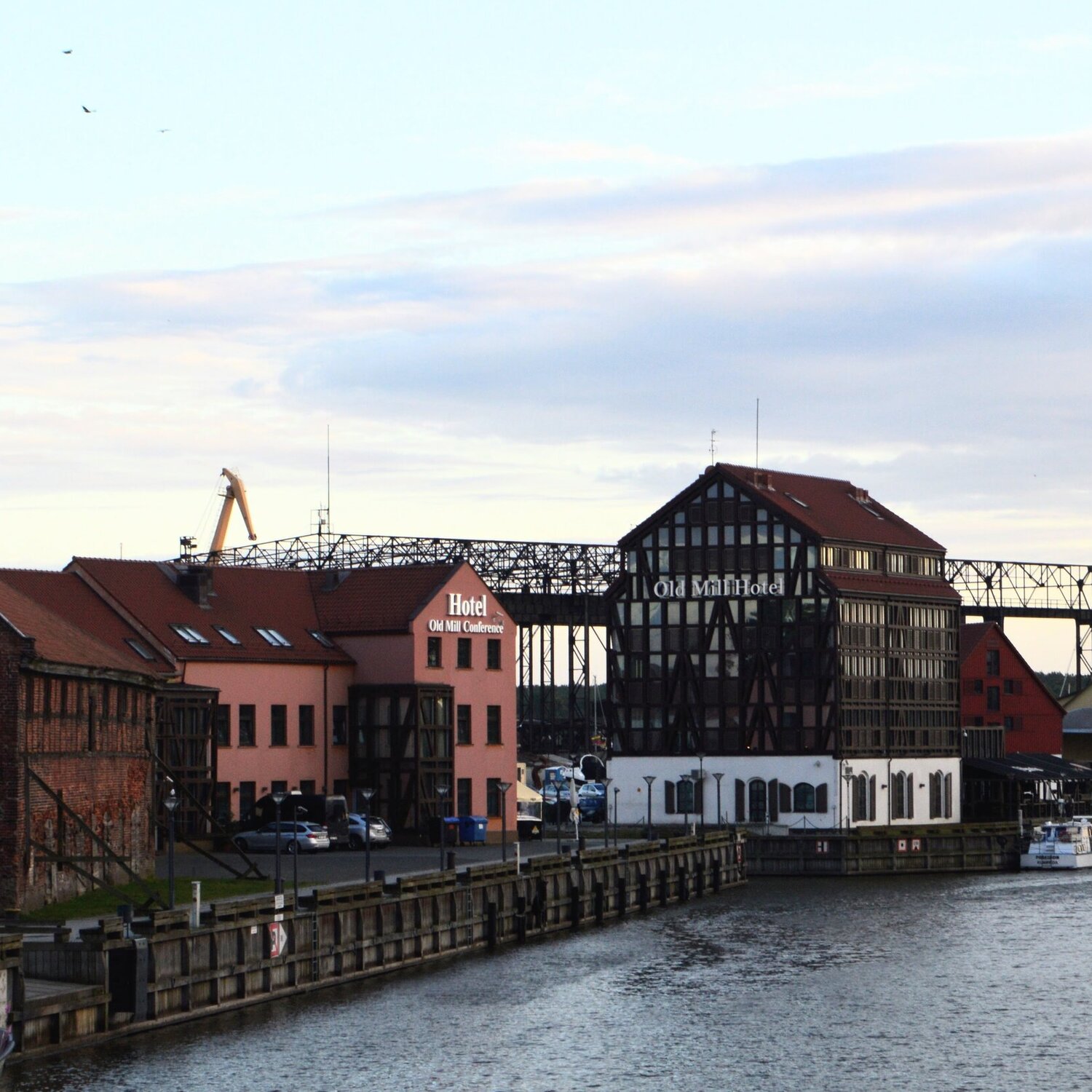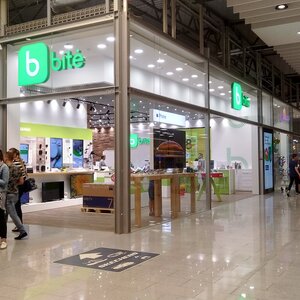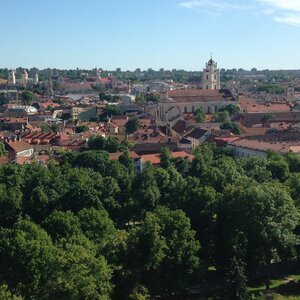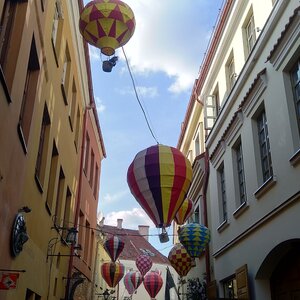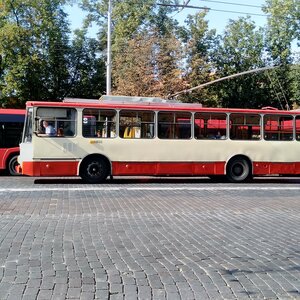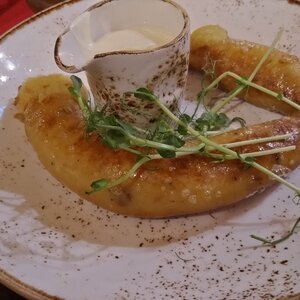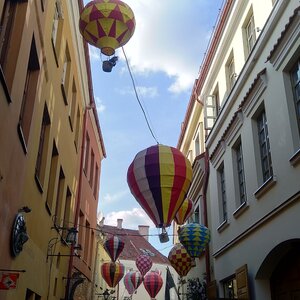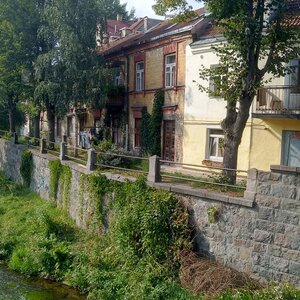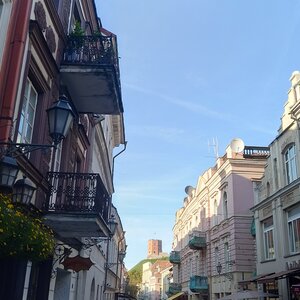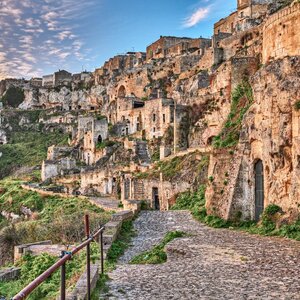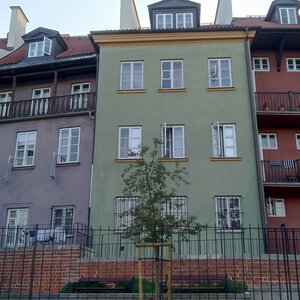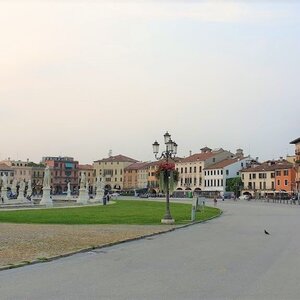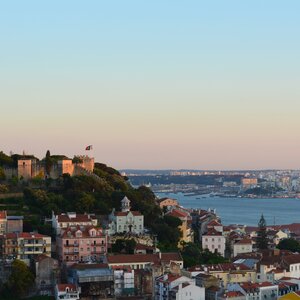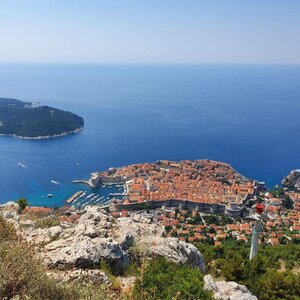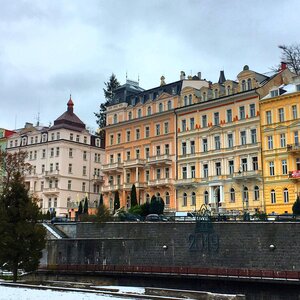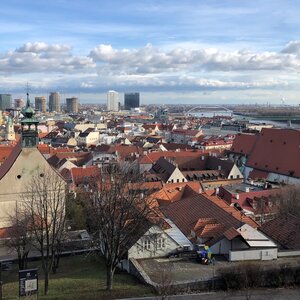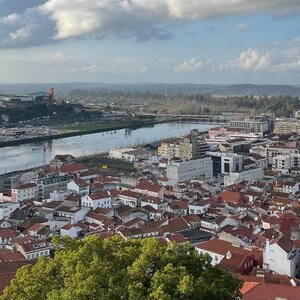Klaipeda was founded by the Teutonic Knights. It was a German city for a long time and was called Memel — and even got into the German anthem as the easternmost city in Germany («From Maas to Memel»). I’ll share my Klaipeda itinerary for a day or two — to explore the city and fall in love.
Neo-Gothic Post (Centrinis Pastas)
This is the most beautiful post office building I’ve ever sent postcards from. The neo-Gothic red brick mansion seems to have been transported to the city from the world of Harry Potter. The post office was built in 1893 and is crowned by a bell tower with a carillon, which is a Lithuanian musical instrument that consists of 48 bells. They are played at noon on weekends.
Open from 09:00 to 19:00, on Saturday until 14:00. Sunday is a day off.
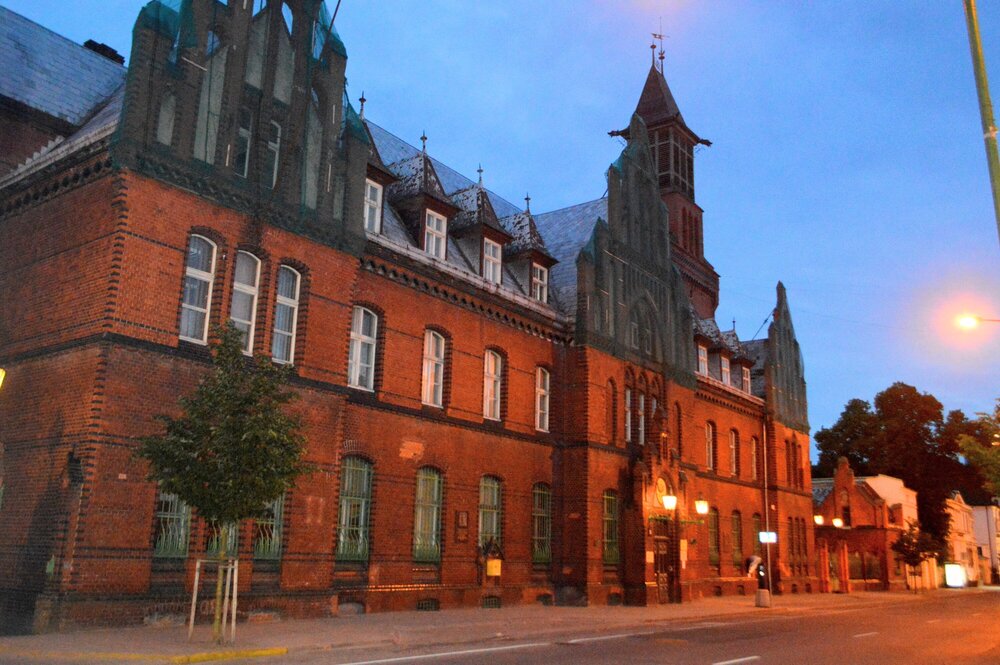
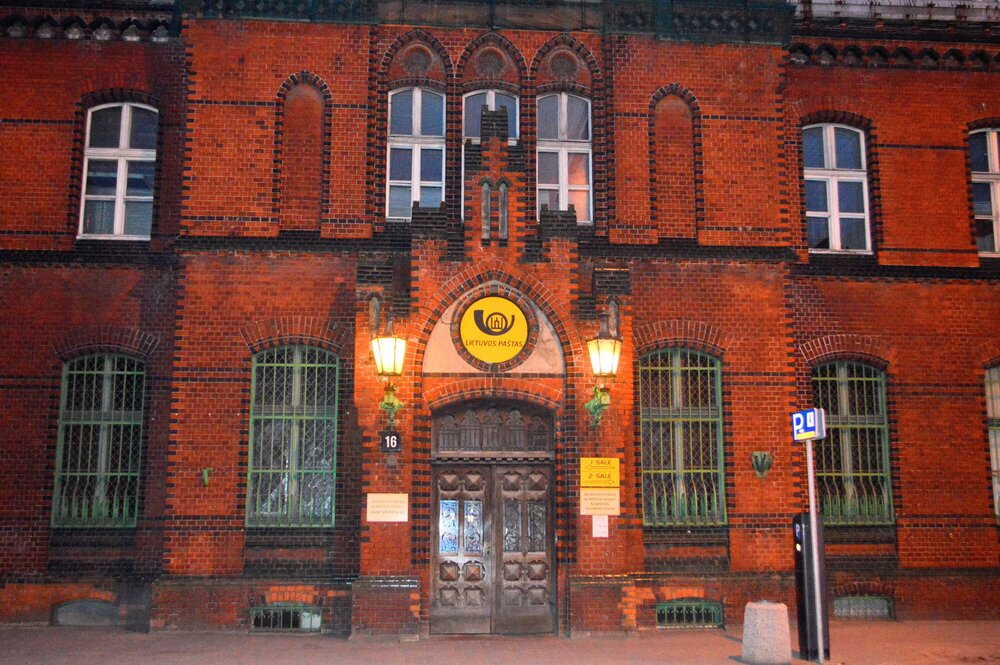
Clock Museum (Laikrodžių muziejus)
The museum occupies the former mansion of Englishman Simpson. The Museum’s clock collection moved into the building in 1984 — and the exhibits themselves began to be collected in 1977. Here you can trace the history of timekeeping mechanisms: from ancient solar and lunar calendars to water and mechanical clocks. A model of atomic clocks stands out — they are used in standardization centers to set the same time all over the world. The museum has an hourglass near the exit, which measures its working hours — in the morning they are turned over, and by the time the museum closes, all the sand is poured out. A separate room is dedicated to showcasing the development of clock decoration — from ornate mechanical clocks to modern minimalist clocks.
In the park near the mansion on the original medieval drawings created sundial and every spring planted flower clocks — plants are placed on the bed in accordance with the time of opening and closing of buds.
- The museum is open Tuesday through Sunday from 12:00 noon to 6:00 pm, Sunday until 5:00 pm.
- The ticket is €4.
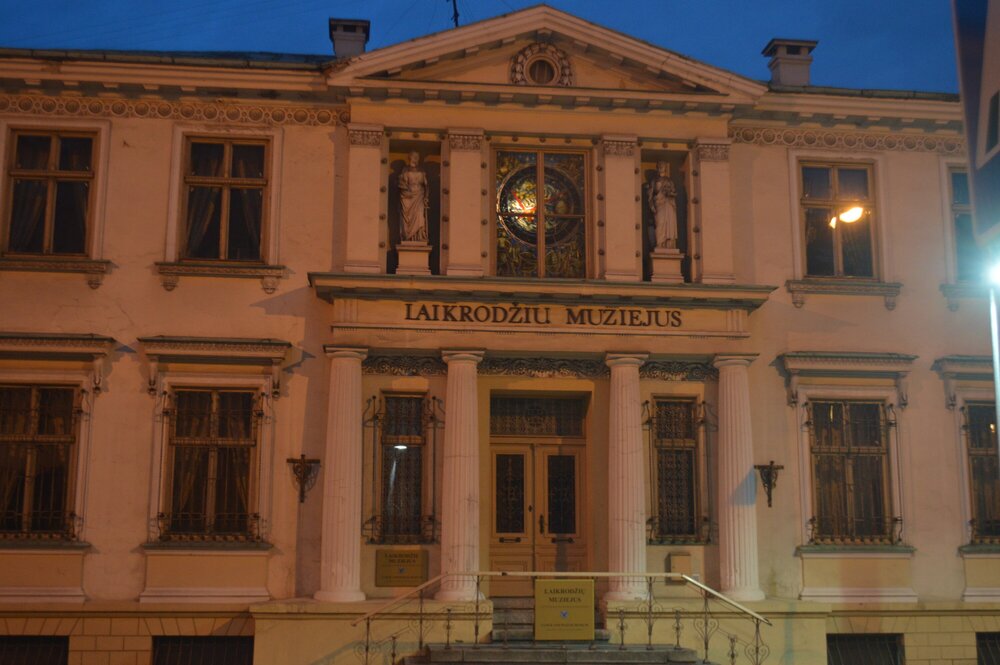
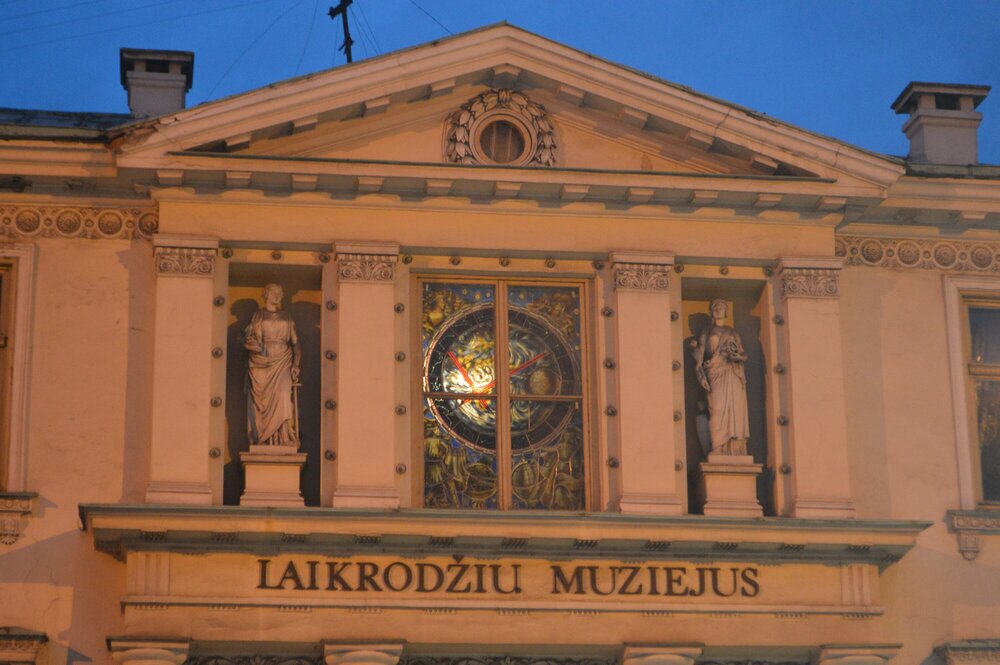
Sailboat Meridian.
The ship at the embankment of the Dana River is one of the recognizable symbols of Klaipeda. This sailing ship was built in Finland in 1948 as a contribution to the USSR for World War II. It served as a training vessel at the Klaipeda Maritime School for 20 years, and in 1969 the sailing ship was put on the embankment and a restaurant was opened in it.
During the day, you can climb aboard, touch the planking and ropes, and even go down into the deckhouse. While there are no restaurant patrons on deck, the staff do not chase away curious tourists.
- Restaurant Menu.
- It’s open until 10:00 p.m.
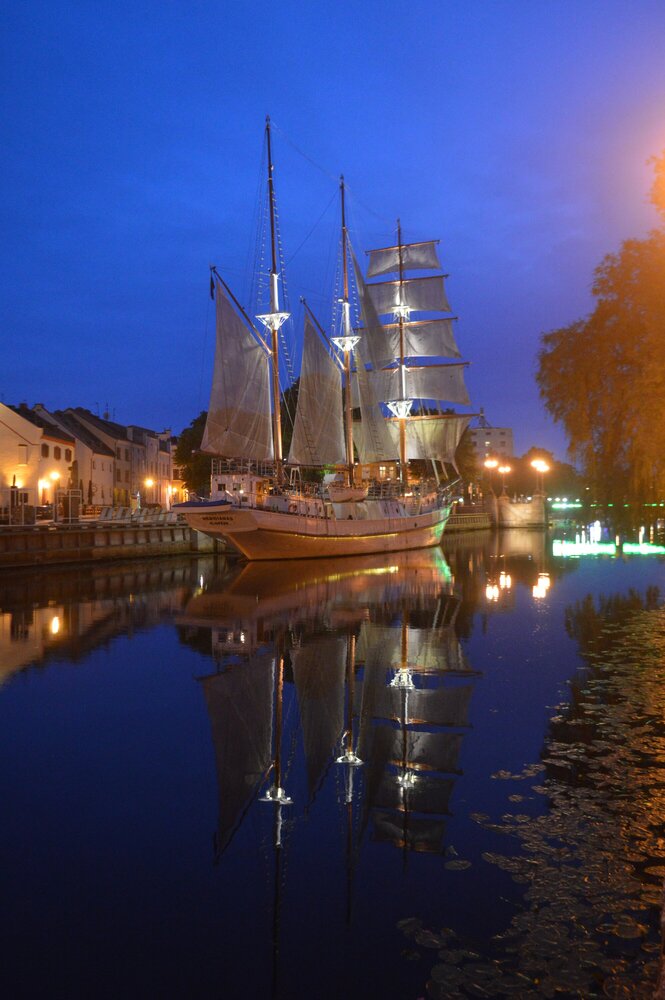
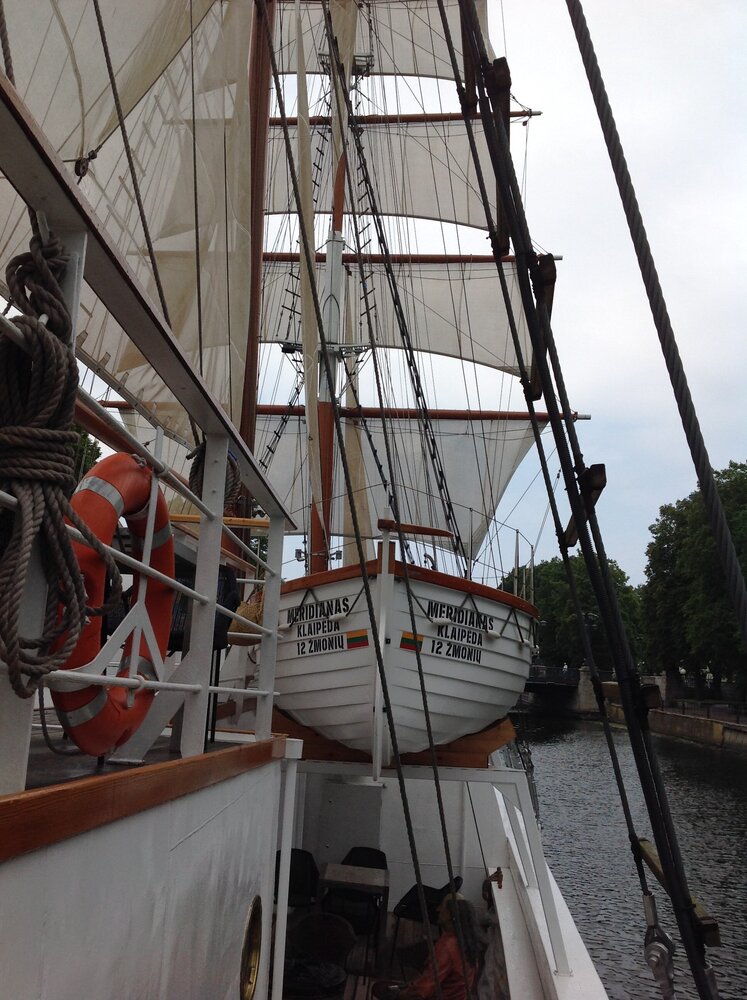
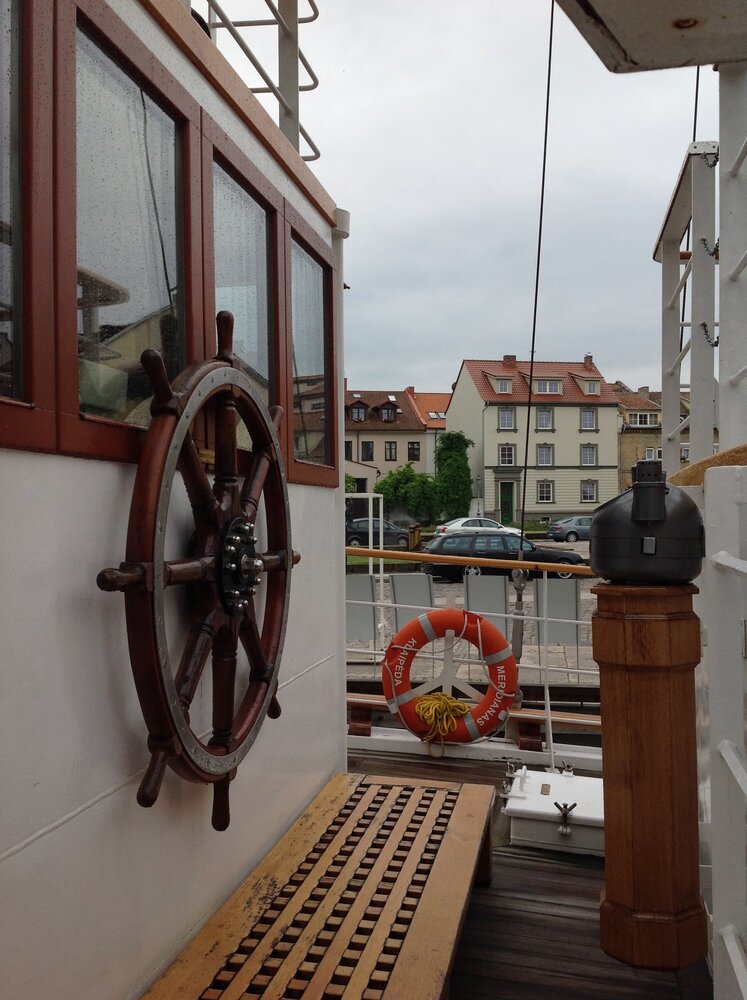
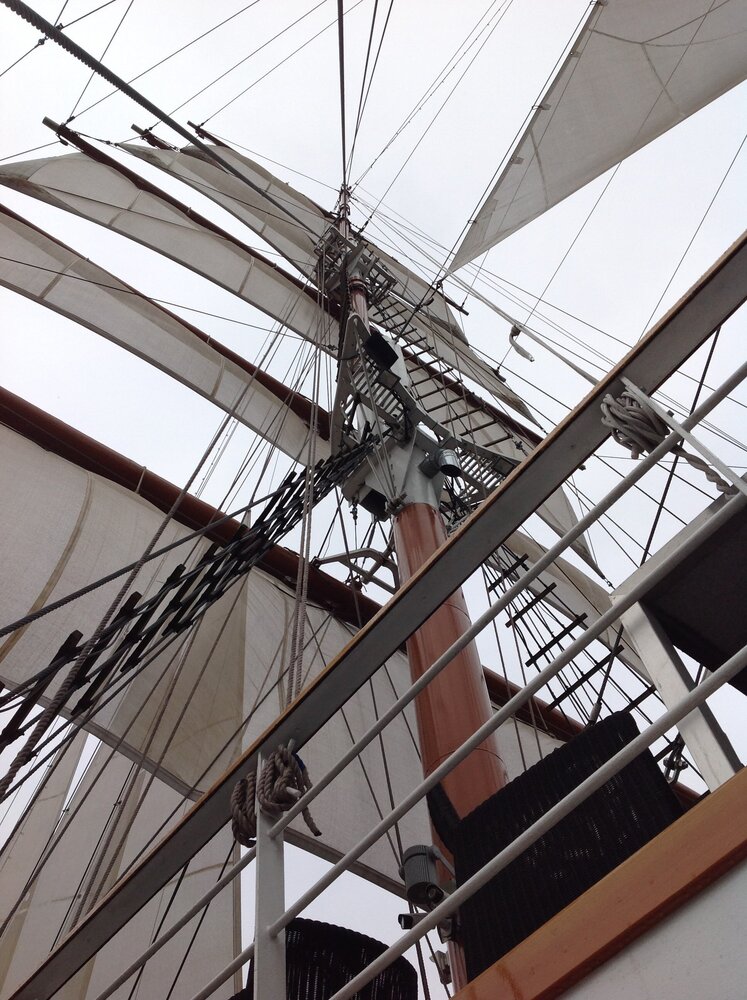
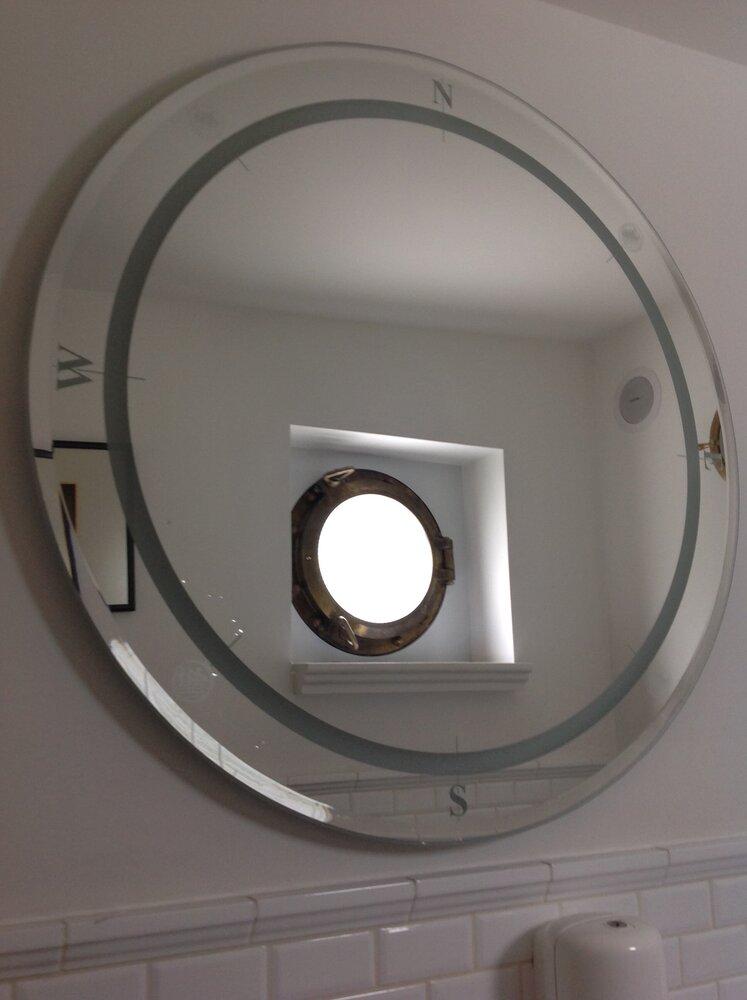
Old Town: Drama Theater and Anika of Torava
The main square of Klaipeda looks deserted for the city center. Until the mid-1950s, there was a market here, and the square was called Market Square. When the market was removed, the square was renamed Teatralna (Teatro aikštė) — the largest theater in the city, the Drama Theater (Klaipėdos dramos teatras), is located here. Adolf Hitler performed on its balcony in 1939, but there is no memorial plaque on the building. The repertoire of performances is here, tickets start from 15 €.
In the center of the square opposite the theater is a fountain with a statue of Anika from Torava (Taravos Anikė). Anikė is the heroine of a poem by Simon Dacha. The poet was in love with the girl, but she was married off to someone else, so he expressed his sadness in the poem. According to another version, the poet did not claim Anika’s love at all, but wrote the poem as a gift for her wedding. The poem was set to music and performed at weddings in Germany and Austria.
The fountain was installed in the square in 1912, but during World War II the Anika sculpture disappeared. Most likely, it was melted down for weapons, like other bronze statues of the city. Legend has it that during Hitler’s speech, only the Anika statue stood with its back to him — so it was destroyed out of revenge. In 1998, the sculpture was restored by donations. Coins for a happy family life are thrown into the fountain.
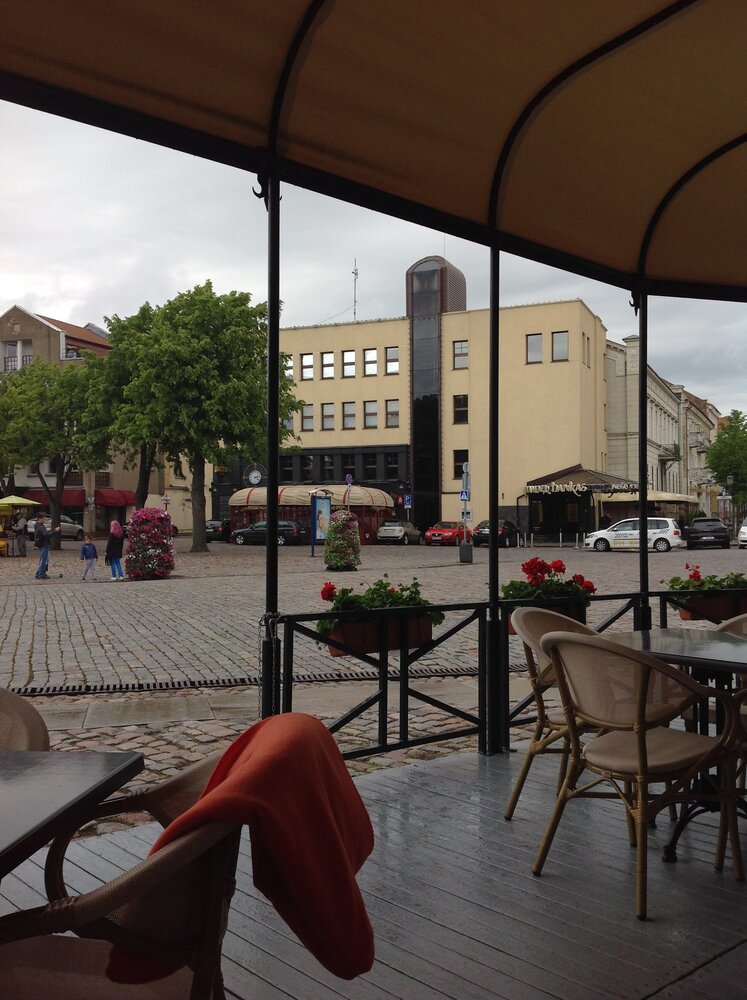
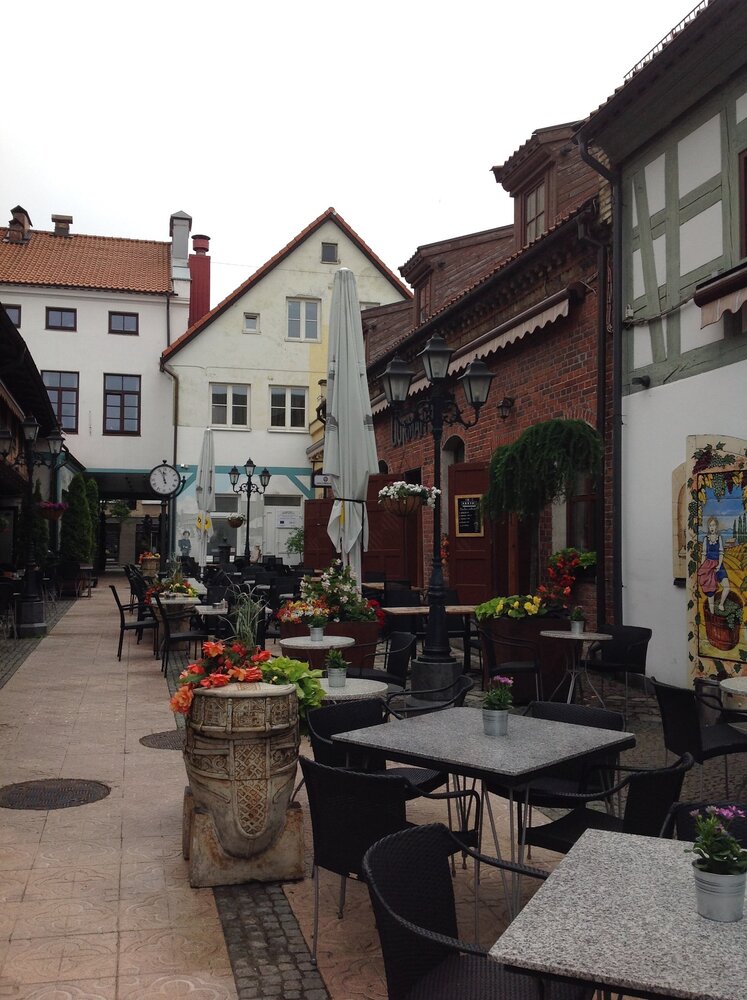
On Theater Square, you should definitely visit Džiugo Namai, a Lithuanian cheese store. Here you can buy local cheeses and drink coffee with cheese dessert. I tried ice cream — made of cheese, of course. Very unusual flavor!
The streets and courtyards of the Old Town are lined with bronze sculptures: a mouse, a dragon, a Doberman — more than 30 small statuettes in total. It all started with the figure of a gentleman cat with a human face — it was created in 1980 by artist Midvikis, and the sculpture was installed in the courtyard of an ordinary residential building. The cat’s tail is rubbed to a shine — it is believed that it can fulfill a cherished wish.
Lithuanian craftsmen picked up the idea of magical creatures — and now in the courtyards and squares of Klaipeda there are small sculptures that you have to rub your paw or whisper your dream to make it come true. Most of these creatures are not marked on maps, so finding them is a whole quest to explore non-tourist Klaipeda.
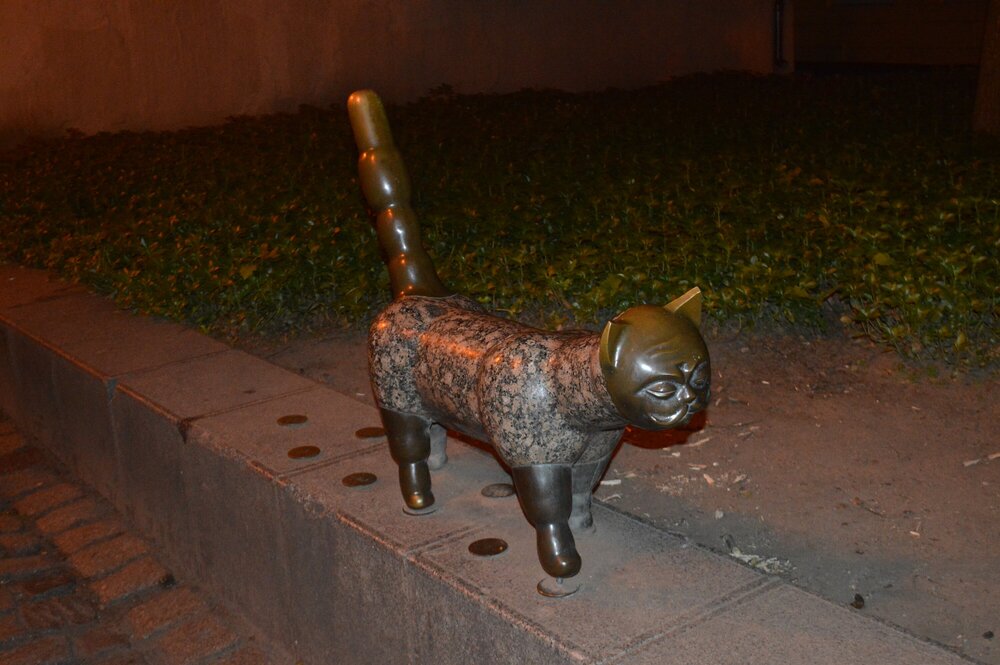
Beer itinerary: excursion to Švyturys
Švyturys Brewery was founded in 1784. The brewery still uses the old German technology of beer production and aging. Tours are organized here: you can see the stages of production with your own eyes and taste 5 types of beer during a tasting. Nearby is a bar where you can have a couple of glasses of Lithuanian unfiltered beer.
Tours take place daily from 11:00 to 20:00, ticket is 15 €. The duration is approximately one and a half hours.
- You can register for the tour by emailing info@svyturysbrewery.lt.
- You can also contact the Klaipeda Tourist Information Center to make an appointment. It is open from 09:00 to 18:00 (until 16:00 on weekends).
In the evening I recommend to look in Faksas bar. There is a large selection of Lithuanian and imported beer, the menu is only in Lithuanian, but the bartenders will tell you everything. The bar plays rock music, and the interior is decorated with portraits of musicians on the walls and drums above the bar. They are open until 04:00 in the morning.
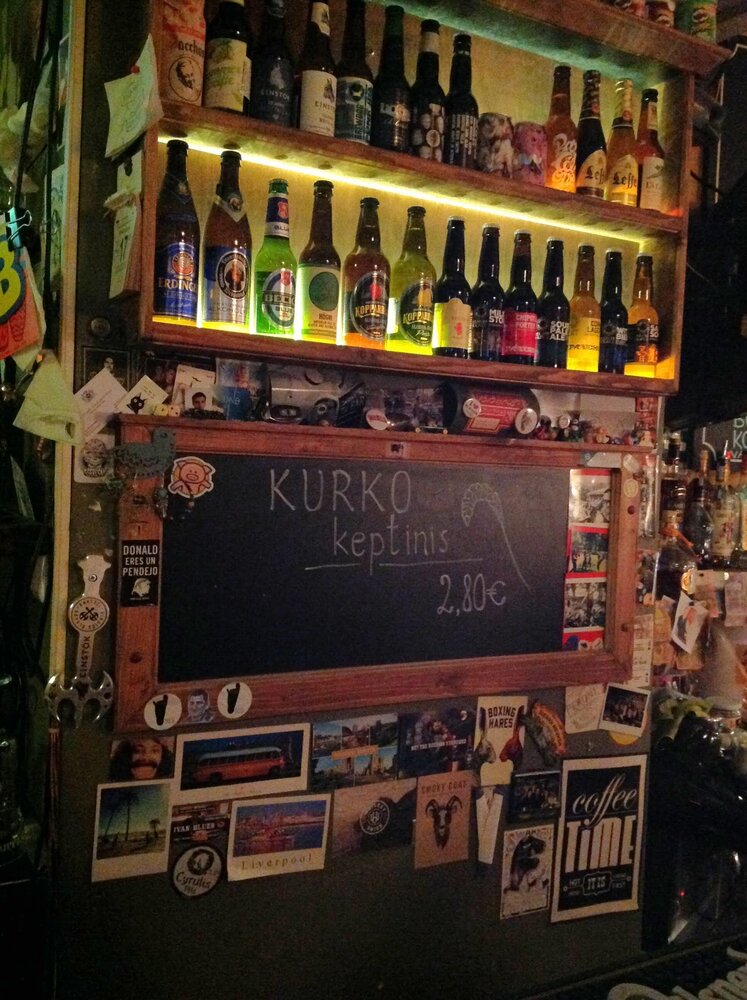
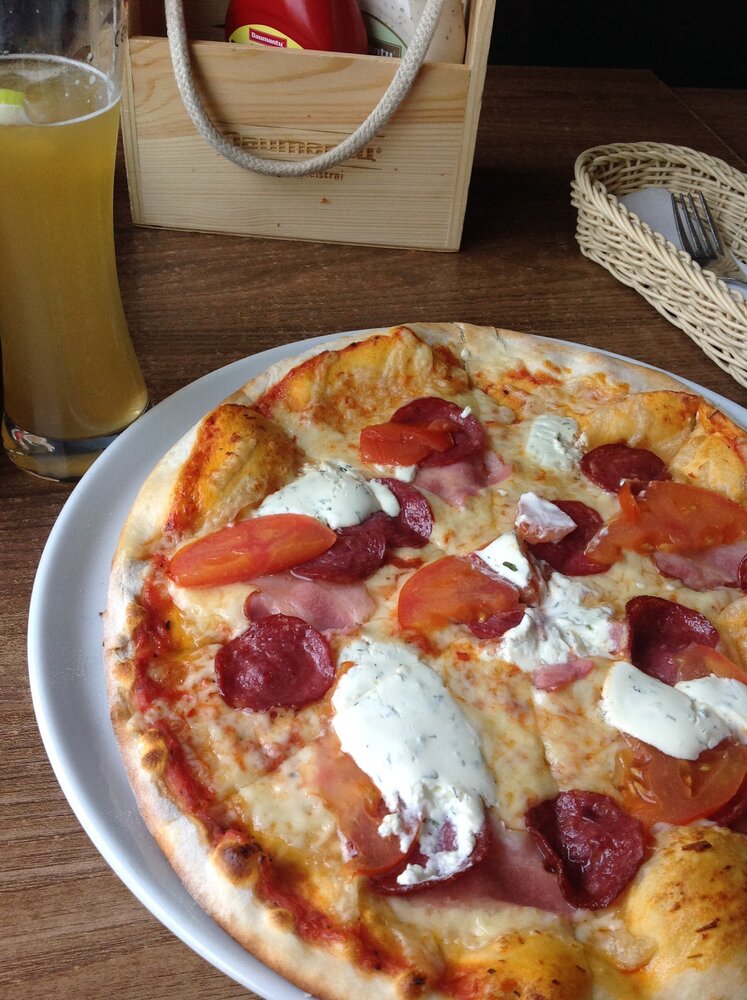
Soviet Church of Mary Queen of Peace (Klaipėdos Marijos Taikos Karalienės bažnyčia)
This is the only Catholic church in the Baltics that was built during the Soviet era — in the late 1950s. During World War II, the previous church was destroyed, which helped the priests to get permission to build a new one. The church was built on the donations of citizens on the outskirts of the city — now it is already the center of Klaipeda. However, immediately after the construction was completed, the church was converted into a philharmonic hall and was returned to the religious community after long requests only in 1988.
The church is minimalist and restrained, inside there are white walls, modern bas-reliefs and a painted altar, very airy and solemn. The church is crowned by a 46-meter spire with an observation deck. Tours to the top of the church are free of charge, you need to sign up at the parish office or by phone +370 46 410120.
Castle Hill and Klaipeda Castle Museum
Klaipeda Castle was destroyed in the XIX century. Now it is being restored, the reconstruction will last at least until 2022. The Historical Museum (Pilies muziejus) is located under the former castle tower, where you can see exhibits found during excavations. Climb Castle Hill for a view of the harbor, ferries and the Curonian Spit on the other side of the bay.
The Museum 39/45 (39/45 muziejus) is located in the same building. It is dedicated to the history of the city during World War II.
- The museums are open Tuesday through Saturday, 10:00 a.m. to 6:00 p.m.
- A ticket to each is €1.74 each.
The castle is surrounded on three sides by a pond, which is connected to the Dana River by the Grandinės tiltas (Turning Bridge). It was built in 1855 and it is the only such bridge in Lithuania. Since its commissioning, it has been manually turned several times a day to allow yachts to moor in the pond. Then it is turned back to connect the two banks.
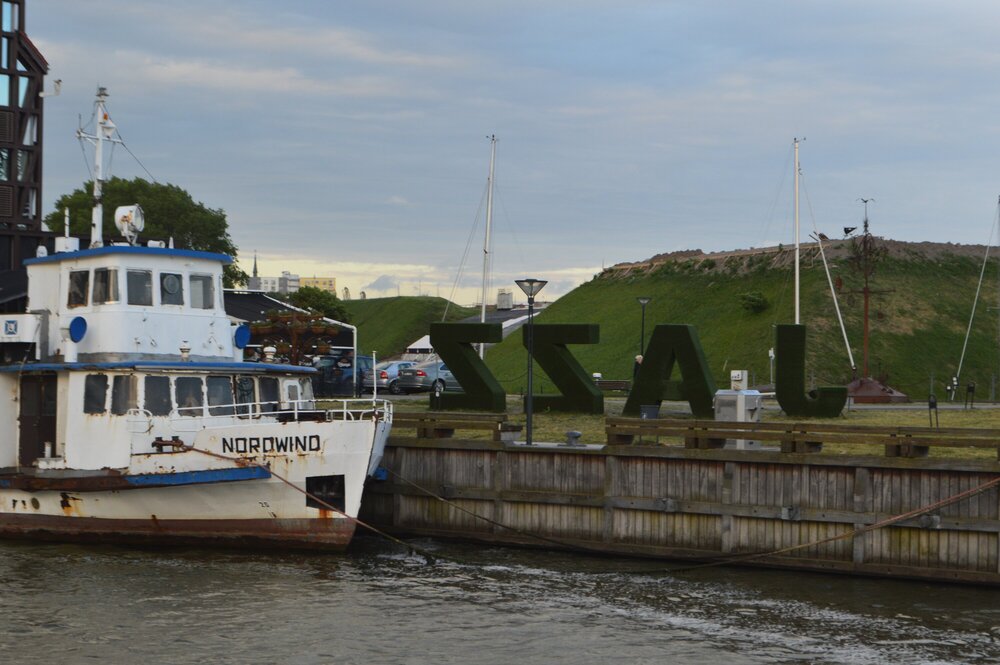
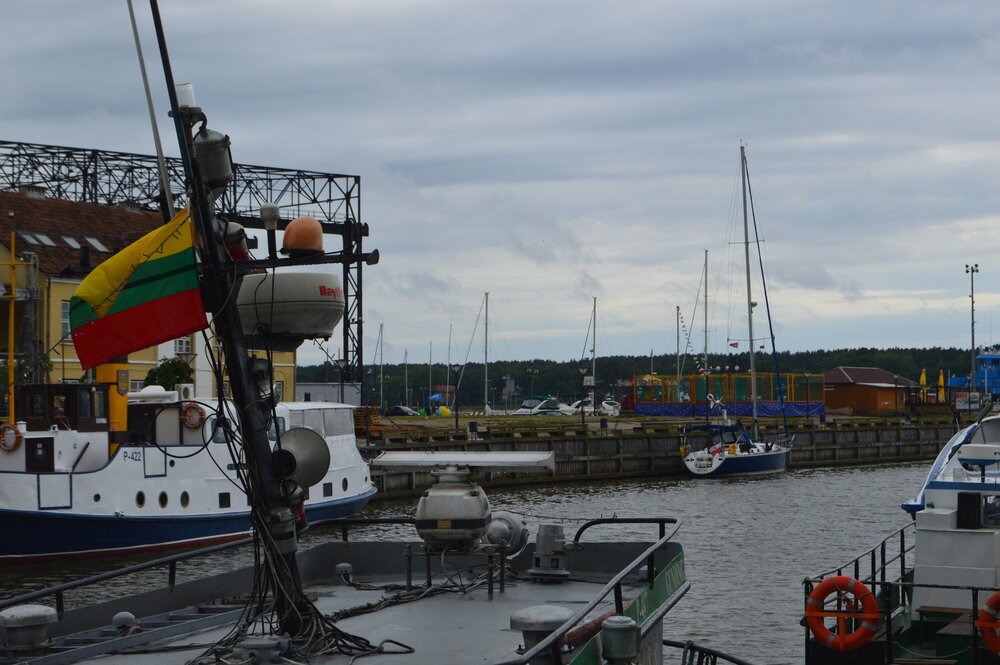
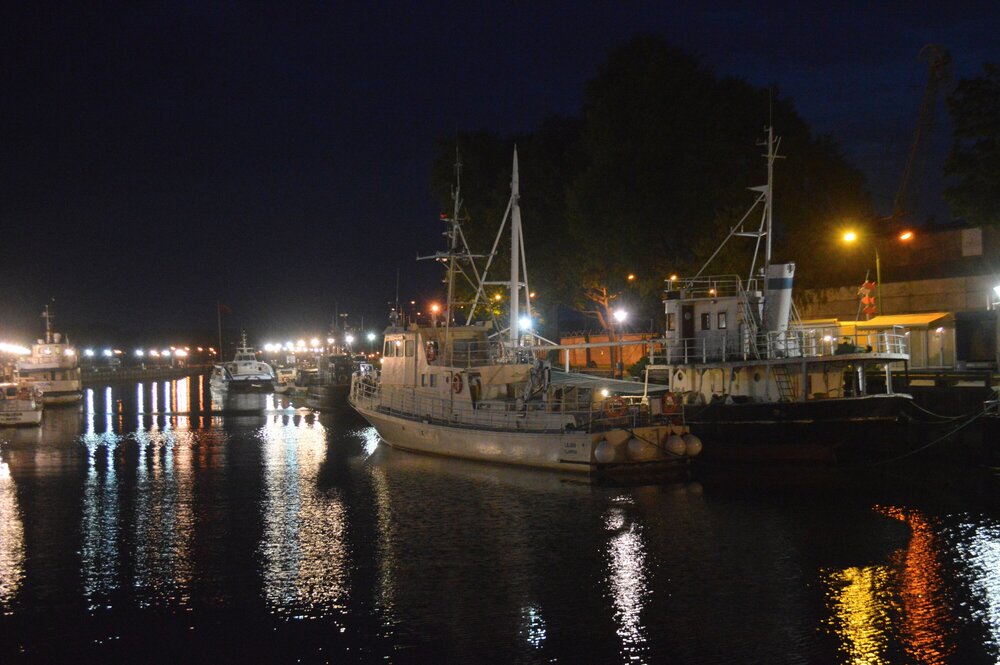
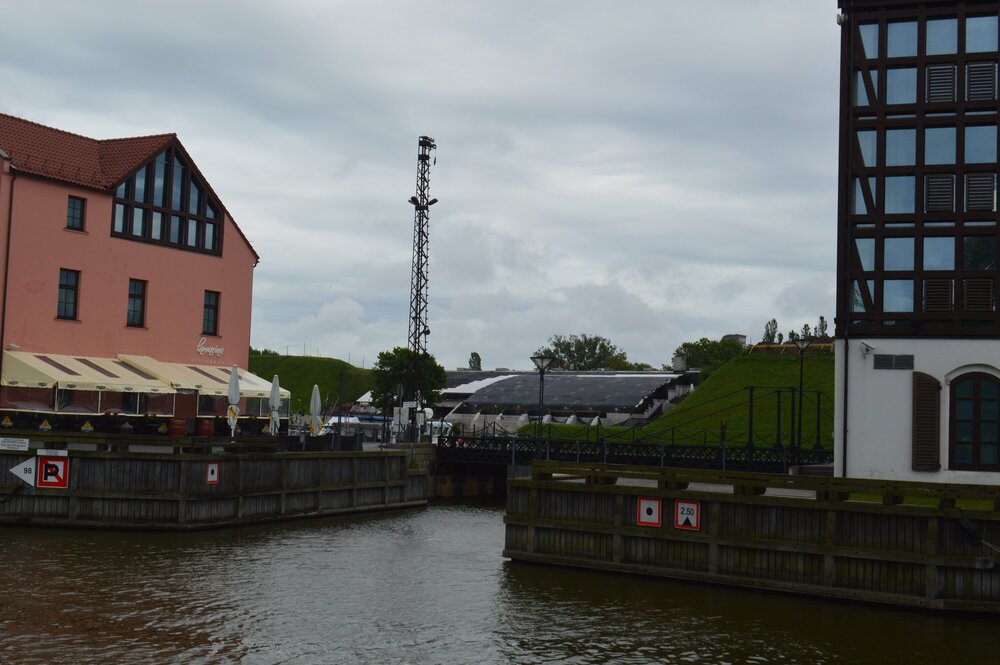
Hotel in the Old Mill Hotel
A rice mill was built in the port of Klaipeda in the 18th century. Rice imported from China was milled and stored here — it was the first and largest rice storage facility in Lithuania. During World War II, bombing raids destroyed most of the mill, only part of the first floor survived.
Since 2008, after reconstruction, a 3-star hotel has been opened here — its windows overlook the Dana River embankment, the marina, the Curonian Spit and the Castle Mountain in the neighborhood.
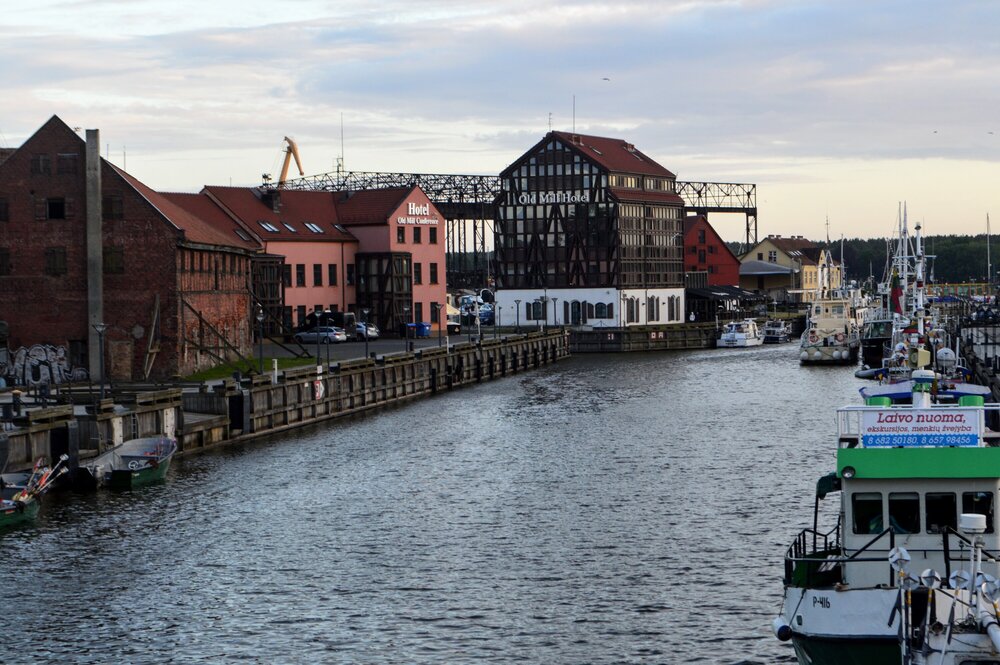
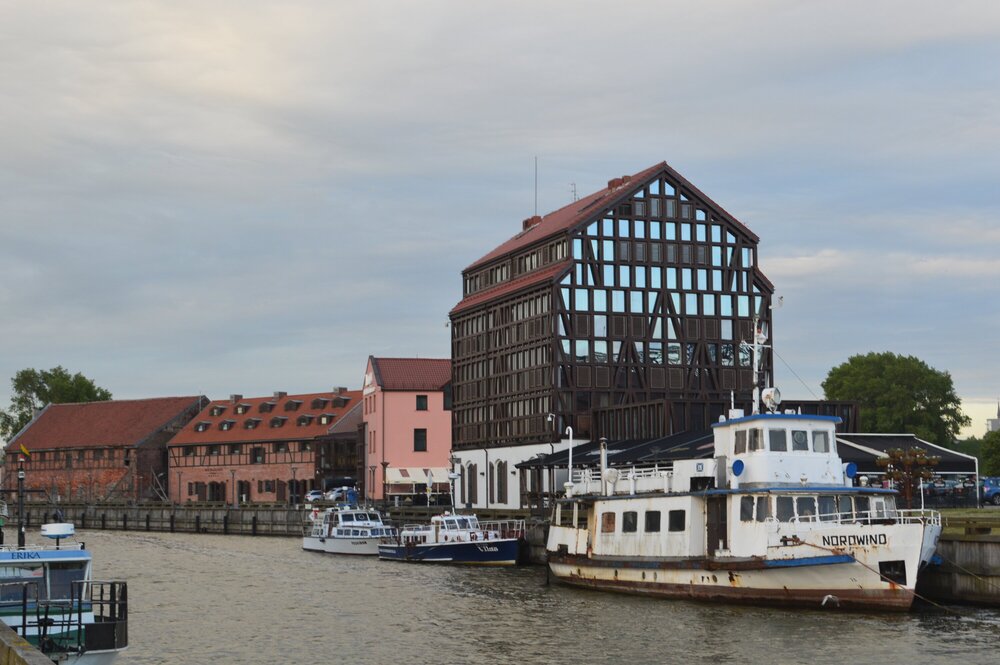
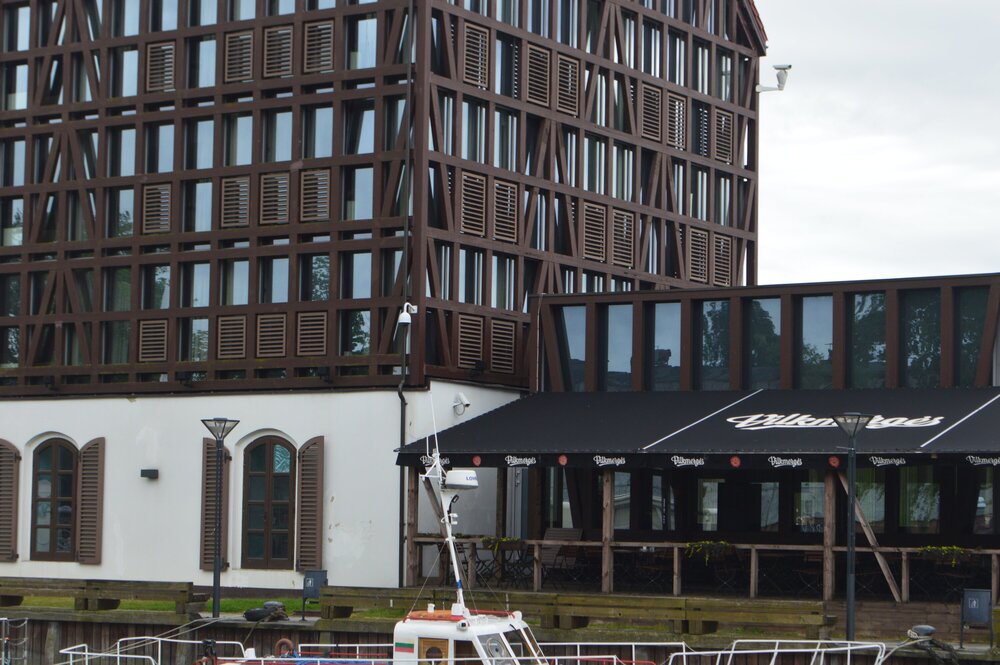
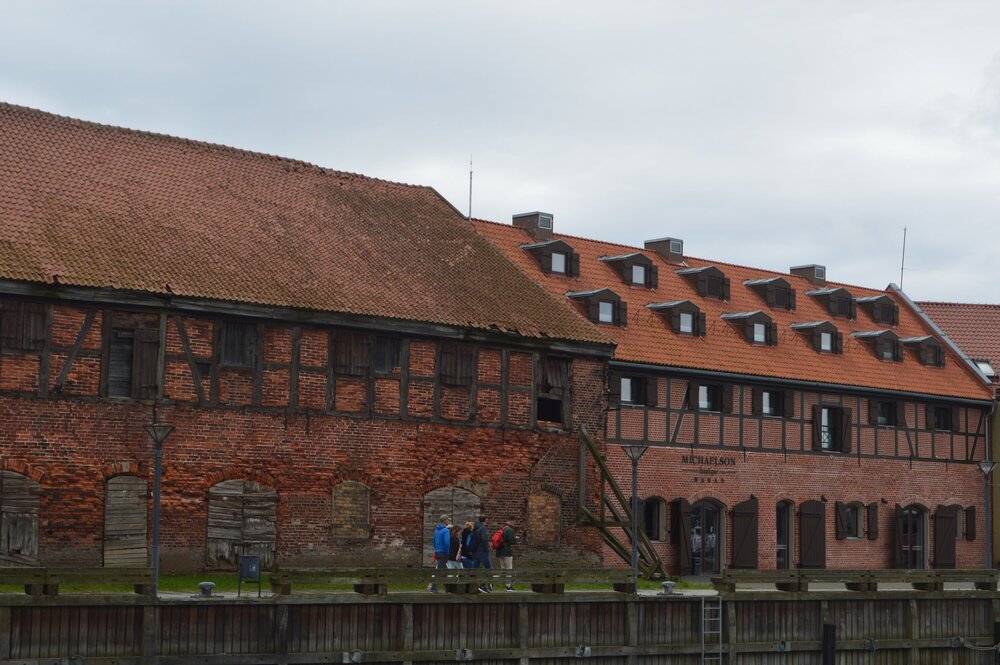
Panorama of Klaipeda from K and D
In the city center, two high-rise buildings in the shape of letters K and D are visible from everywhere — a hotel and a business center. They stand for the city of Klaipeda (Klaipeda — tower K) and the Dane River (Dane — tower D).
There is a panoramic restaurant called XII on the 12th floor of the K building. It’s small, but I was lucky enough to get in without a reservation. You should definitely come here closer to sunset. The restaurant has a beautiful view of the sunset reflecting in the sea and the cityscape. There is even a toilet with a panoramic view.
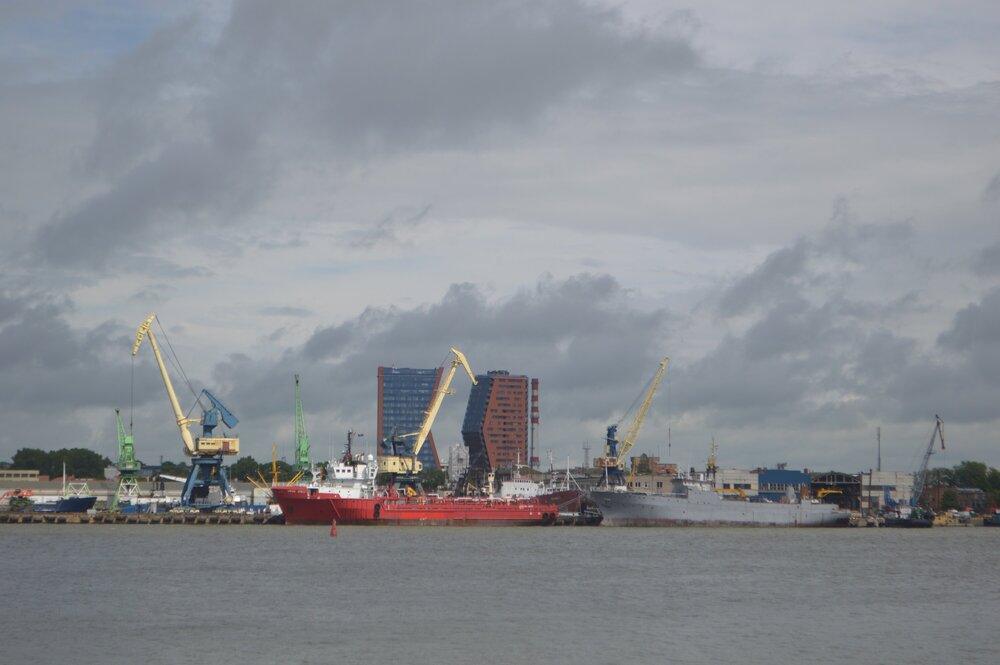
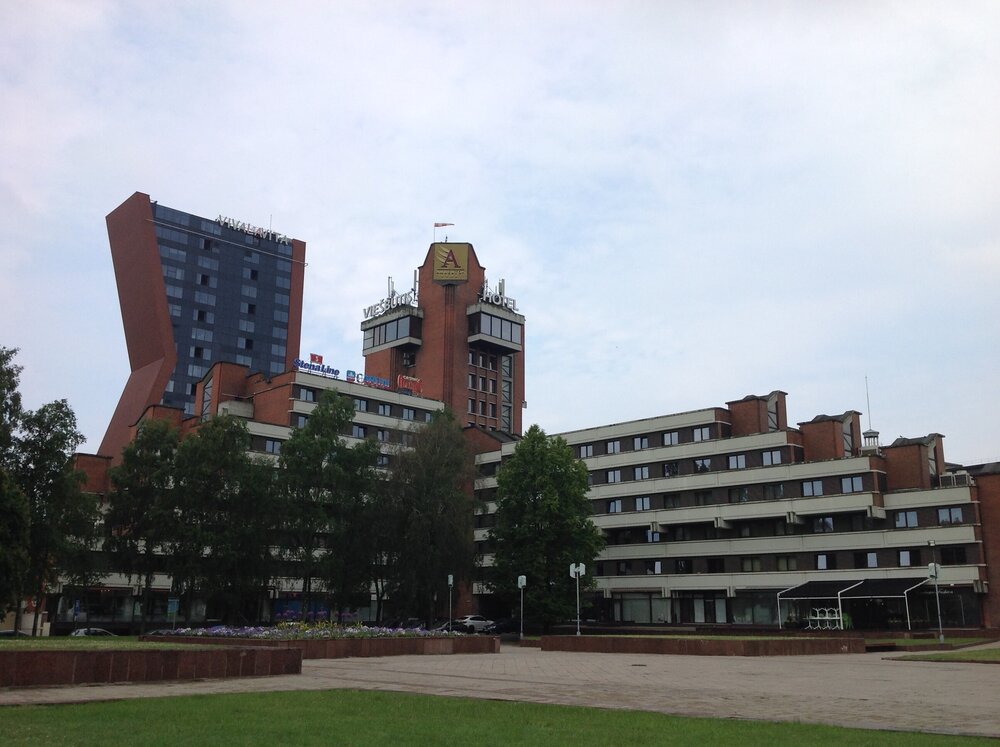
If you don’t want to spend money at the restaurant bar, you can go up to the top 21st floor of the same skyscraper. There is an elevator with glass walls — on the way you will see about the same panorama as from restaurant XII, very fast, but for free. I rode up and down several times — nobody kicked me out of the elevator. You don’t get earaches from the fast ascent.
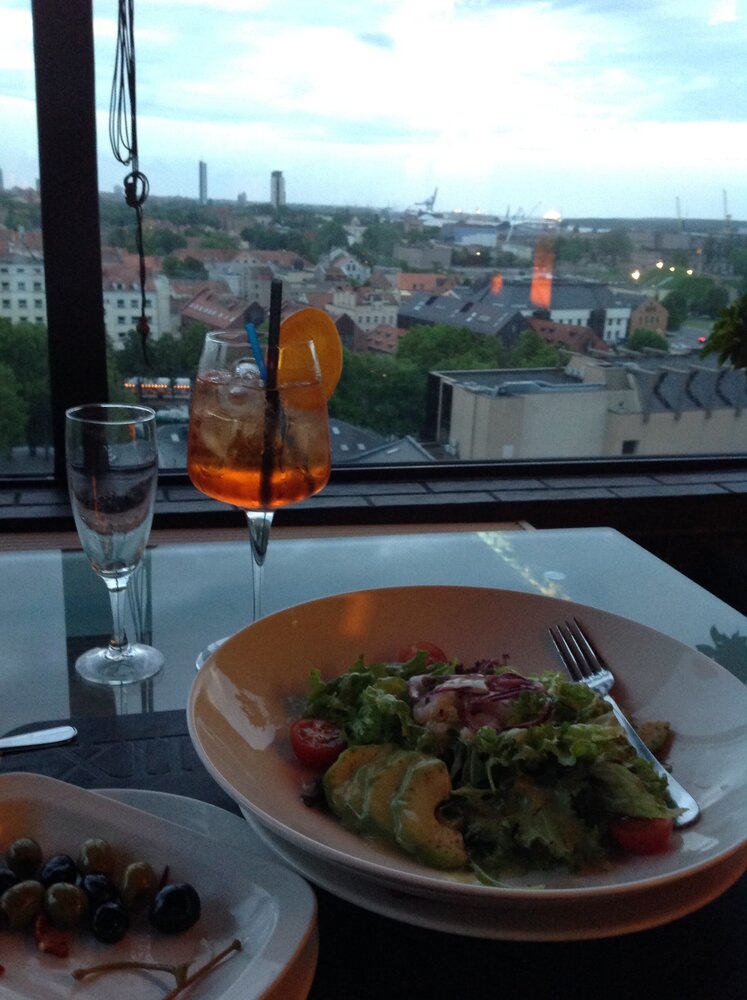
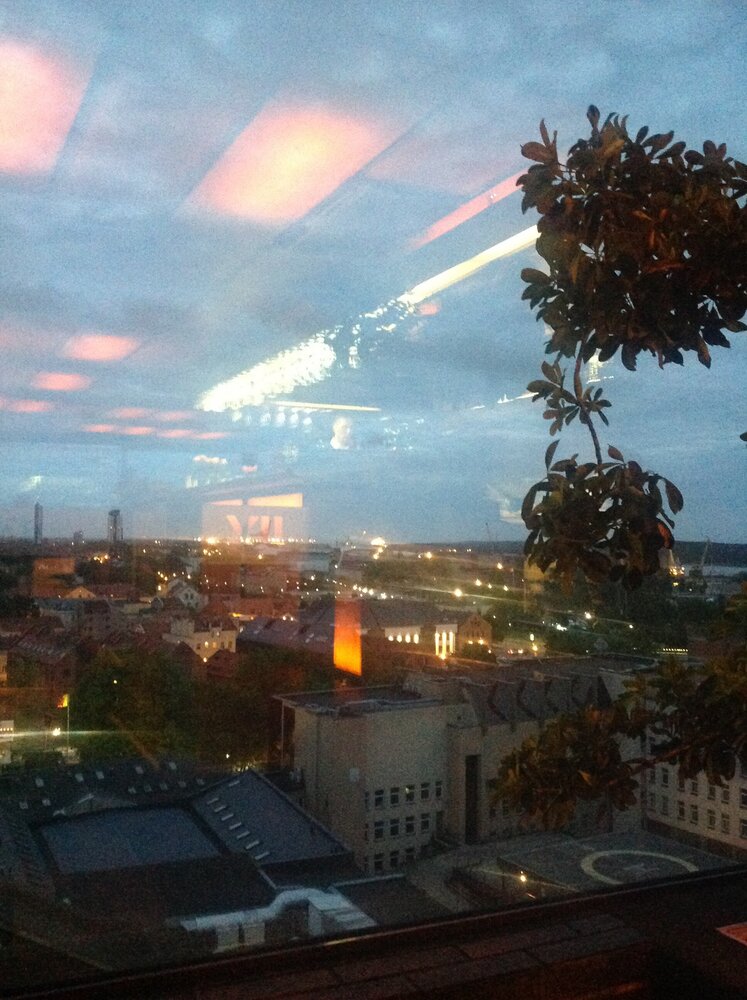
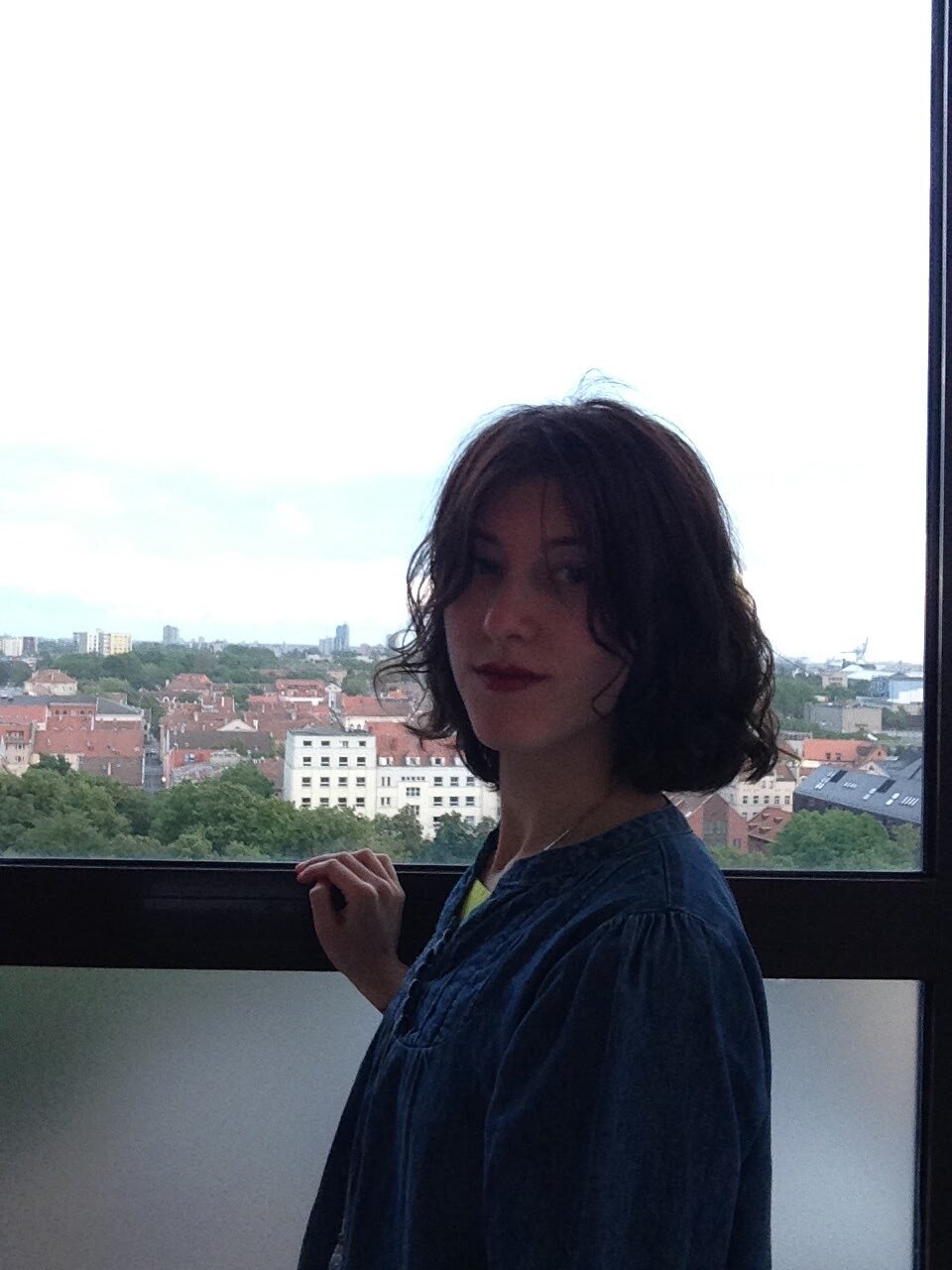
Jazz Festival (Klaipėdos Pilies/Castle Jazz Festival)
Every year on the first weekend of June, the city hosts a jazz festival. The festival tries to draw attention to the architectural and cultural objects of the region — that is why its logo features the symbol of Klaipeda Castle. Jazz musicians from neighboring Ukraine, Poland and America perform on stage. The slogan of the festival is: «Good music for good people!»
In 2020, the festival was moved to September 3—5. The festival is held outdoors, with a stage set up in the cruise ship terminal area. Entrance is free of charge.
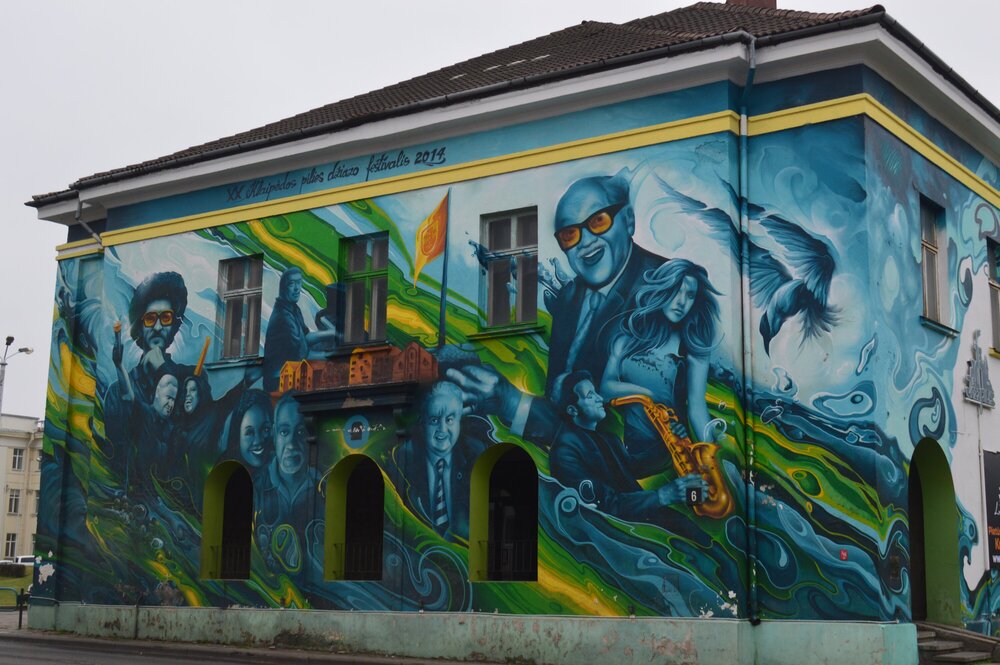
Bonus: get away to the sea in Palanga or the Curonian Spit
Just 30 minutes drive from Klaipeda is the resort village of Palanga. There is a pine forest, a promenade by the sea and waffles with berries. All the tips and tricks about Palanga are here.
And on the Curonian Spit the biggest dunes in Europe, smoked fish and fresh pine air.
Where to stay in Klaipeda
In the hotel Amberton 4* you can choose a room with a sea or city view — they are located in different buildings of high-rise in the form of letters K and D. Double rooms from 50 €.
You can stay in the National Hotel' s historic rooms for 100 € — the hotel has a restaurant serving local cuisine.
Hotel Bohema offers a romantic night in the attic — for only 44 € for a double room.
From hostels I recommend Klaipeda Hostel — a place in a room for six from 13 €, tea and coffee in the kitchen, in rainy weather they lend umbrellas for walking around the city.
How to get to Klaipeda
There are direct buses and trains to Klaipeda from Vilnius. The journey takes about 4 hours. There is wi-fi in the buses and carriages, so you won’t get bored.
Klaipėda railway and bus stations are close by. There is a sculpture park (Klaipėdos skulptūrų parkas) near the station square. It is convenient to walk to the city center through this park, you can admire the sculptures of the Soviet period.
Worth knowing when traveling to Klaipeda
- Take a waterproof jacket with you. Klaipeda is a maritime city, and there is almost always a fresh wind blowing from the bay, and sometimes it rains without warning — and at any time of the year.
- Do not expect everyone to speak Russian to you. In Klaipeda, as in the whole of the Baltics, Russian is not compulsory. The older generation is likely to know Russian, but most young people have to speak English.
- The best souvenirs from Klaipeda are amber and leather jewelry. You should buy them only in a branded store with a certificate, so as not to run into a fake — for example, Amber Queen. Prices bite: from 50 € for a small pendant. I always buy something edible — local cheese and aromatic Klaipeda bread with seeds for the road. What else to bring from Lithuania.

